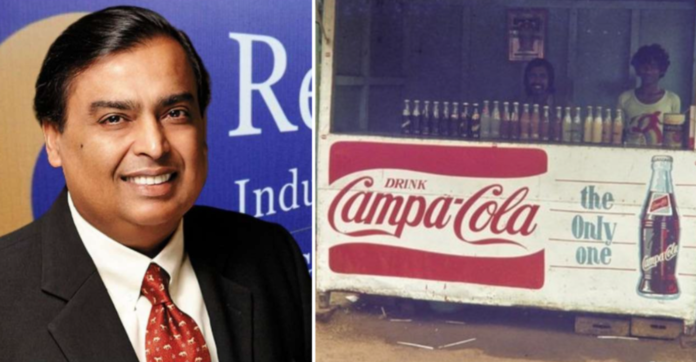Reliance Industries’ acquisition of carbonated beverages maker Pure Drinks and the associated Campa brands is less than miniscule by RIL’s standards. At a reported ₹22 crore, the once iconic soft drinks brand cost Reliance just 0.001 per cent of its net profits in just the first quarter of the current financial year.
But the size of the deal is deceptive. The acquisition masks a triple play which ought to make not only multinational cola giants Coke and Pepsico very nervous indeed, but ought to be–if it hasn’t already–lighting fires at other FMCG majors.
Campa Cola– once the market leader with its soft drink – is going to make a comeback. After announcing its Jio 5G launch by Diwali this year, Reliance’s basket of Diwali gifts for the country hasn’t been exhausted. It has acquired the home-grown aerated beverage brand from Delhi-based company – Pure Drinks – in a deal estimated at Rs 22 crore, as part of its strategy to scale up the FMCG business. And it is bringing back India’s once-favourite desi cola in Reliance’s own stores and kiranas, in a national relaunch.
Led by Isha Ambani, Reliance Retail is foraying into the FMCG business this year, and among the first steps seems to be taking on the fight with the American cola giants — Coca-Cola and PepsiCo — by nationally relaunching the iconic Campa in the cola, lemon and orange flavours through the Reliance Retail stores, JioMart and the over 15 lakh kiranas who buy products from Reliance’s B2B network, according to a news report in the Economic Times.
The Coca-Cola Company started operating in India in 1950 and soon was the market leader with its eponymous soft drink. However, in 1977 the Indian government insisted that it reveal its secret formula – a closely-guarded secret it has held close to its chest for over a century-and-half. On refusing to share the formula, it withdrew its operations from India, ostensibly in protest of regulations and legislation. Widely regarded then as a symbol of Western cultural imperialism, Coca-Cola was replaced with native Indian brands like Campa and Bovonto. While Campa Cola was the leading the north Indian markets, Bovonto ruled the south and Sosyo had established itself in the western parts of the country. Sosyo was created by Surat-based Hajoori Beverages, as a product of the Swadeshi movement of the Indian independence struggle in 1927, as the Indian option to the UK-based drink Vimto.
Campa Cola was created by Delhi-based Pure Drinks Group, which was originally founded as a bottler and distributor of Coca-Cola. With the vacuum created by Coca-Cola, Campa seized the opportunity and branded itself with the slogan – “The Great Indian Taste”. It was only a matter of time that Campa Cola, along with soft drinks developed by Mumbai-based Parle — Gold Spot, Limca and Thums Up — had conquered most of the market in India’s most populous segments.
However, Coca-Cola re-entered India, this time along with Pepsico’s Pepsi. Riding high on the funds being pumped into gaining a strong presence in the Indian markets, it was a matter of time before they pushed the homegrown brands to obscurity. On its re-entry, Coca-Cola eliminated most of the competition by acquiring the three Parle brands. Strapped for funds, Campa could not compete and slowly faded out of the market. The market for Coca-Cola and Pepsi, and their acquisitions have been unshaken since.
Known for routing out its competitors, Reliance has created a niche for itself. The Indian multinational conglomerate has dipped its fingers in every pie conceivable – from petrochemicals to fashion, textiles to telecommunications. It was a matter of time before they headed into the FMCG sector, and their start is by tapping into the sentiment of the cola brand’s Indian-ness. Campa-Cola has the right amount of fizz to provide them with the perfect launchpad.


